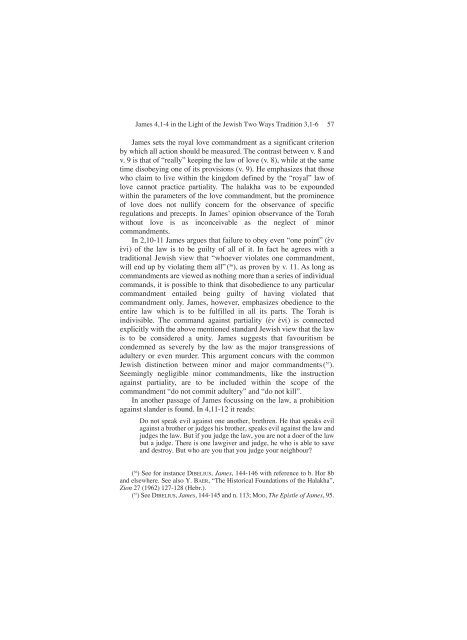James 4,1-4 in the Light of the Jewish Two Ways Tradition 3,1-6
James 4,1-4 in the Light of the Jewish Two Ways Tradition 3,1-6
James 4,1-4 in the Light of the Jewish Two Ways Tradition 3,1-6
You also want an ePaper? Increase the reach of your titles
YUMPU automatically turns print PDFs into web optimized ePapers that Google loves.
<strong>James</strong> 4,1-4 <strong>in</strong> <strong>the</strong> <strong>Light</strong> <strong>of</strong> <strong>the</strong> <strong>Jewish</strong> <strong>Two</strong> <strong>Ways</strong> <strong>Tradition</strong> 3,1-6 57<br />
<strong>James</strong> sets <strong>the</strong> royal love commandment as a significant criterion<br />
by which all action should be measured. The contrast between v. 8 and<br />
v. 9 is that <strong>of</strong> “really” keep<strong>in</strong>g <strong>the</strong> law <strong>of</strong> love (v. 8), while at <strong>the</strong> same<br />
time disobey<strong>in</strong>g one <strong>of</strong> its provisions (v. 9). He emphasizes that those<br />
who claim to live with<strong>in</strong> <strong>the</strong> k<strong>in</strong>gdom def<strong>in</strong>ed by <strong>the</strong> “royal” law <strong>of</strong><br />
love cannot practice partiality. The halakha was to be expounded<br />
with<strong>in</strong> <strong>the</strong> parameters <strong>of</strong> <strong>the</strong> love commandment, but <strong>the</strong> prom<strong>in</strong>ence<br />
<strong>of</strong> love does not nullify concern for <strong>the</strong> observance <strong>of</strong> specific<br />
regulations and precepts. In <strong>James</strong>’ op<strong>in</strong>ion observance <strong>of</strong> <strong>the</strong> Torah<br />
without love is as <strong>in</strong>conceivable as <strong>the</strong> neglect <strong>of</strong> m<strong>in</strong>or<br />
commandments.<br />
In 2,10-11 <strong>James</strong> argues that failure to obey even “one po<strong>in</strong>t” (ejn<br />
eJniv) <strong>of</strong> <strong>the</strong> law is to be guilty <strong>of</strong> all <strong>of</strong> it. In fact he agrees with a<br />
traditional <strong>Jewish</strong> view that “whoever violates one commandment,<br />
will end up by violat<strong>in</strong>g <strong>the</strong>m all”( 56 ), as proven by v. 11. As long as<br />
commandments are viewed as noth<strong>in</strong>g more than a series <strong>of</strong> <strong>in</strong>dividual<br />
commands, it is possible to th<strong>in</strong>k that disobedience to any particular<br />
commandment entailed be<strong>in</strong>g guilty <strong>of</strong> hav<strong>in</strong>g violated that<br />
commandment only. <strong>James</strong>, however, emphasizes obedience to <strong>the</strong><br />
entire law which is to be fulfilled <strong>in</strong> all its parts. The Torah is<br />
<strong>in</strong>divisible. The command aga<strong>in</strong>st partiality (ejn eJniv) is connected<br />
explicitly with <strong>the</strong> above mentioned standard <strong>Jewish</strong> view that <strong>the</strong> law<br />
is to be considered a unity. <strong>James</strong> suggests that favouritism be<br />
condemned as severely by <strong>the</strong> law as <strong>the</strong> major transgressions <strong>of</strong><br />
adultery or even murder. This argument concurs with <strong>the</strong> common<br />
<strong>Jewish</strong> dist<strong>in</strong>ction between m<strong>in</strong>or and major commandments ( 57 ).<br />
Seem<strong>in</strong>gly negligible m<strong>in</strong>or commandments, like <strong>the</strong> <strong>in</strong>struction<br />
aga<strong>in</strong>st partiality, are to be <strong>in</strong>cluded with<strong>in</strong> <strong>the</strong> scope <strong>of</strong> <strong>the</strong><br />
commandment “do not commit adultery” and “do not kill”.<br />
In ano<strong>the</strong>r passage <strong>of</strong> <strong>James</strong> focuss<strong>in</strong>g on <strong>the</strong> law, a prohibition<br />
aga<strong>in</strong>st slander is found. In 4,11-12 it reads:<br />
Do not speak evil aga<strong>in</strong>st one ano<strong>the</strong>r, brethren. He that speaks evil<br />
aga<strong>in</strong>st a bro<strong>the</strong>r or judges his bro<strong>the</strong>r, speaks evil aga<strong>in</strong>st <strong>the</strong> law and<br />
judges <strong>the</strong> law. But if you judge <strong>the</strong> law, you are not a doer <strong>of</strong> <strong>the</strong> law<br />
but a judge. There is one lawgiver and judge, he who is able to save<br />
and destroy. But who are you that you judge your neighbour?<br />
( 56 ) See for <strong>in</strong>stance DIBELIUS, <strong>James</strong>, 144-146 with reference to b. Hor 8b<br />
and elsewhere. See also Y. BAER, “The Historical Foundations <strong>of</strong> <strong>the</strong> Halakha”,<br />
Zion 27 (1962) 127-128 (Hebr.).<br />
( 57 ) See DIBELIUS, <strong>James</strong>, 144-145 and n. 113; MOO, The Epistle <strong>of</strong> <strong>James</strong>, 95.


